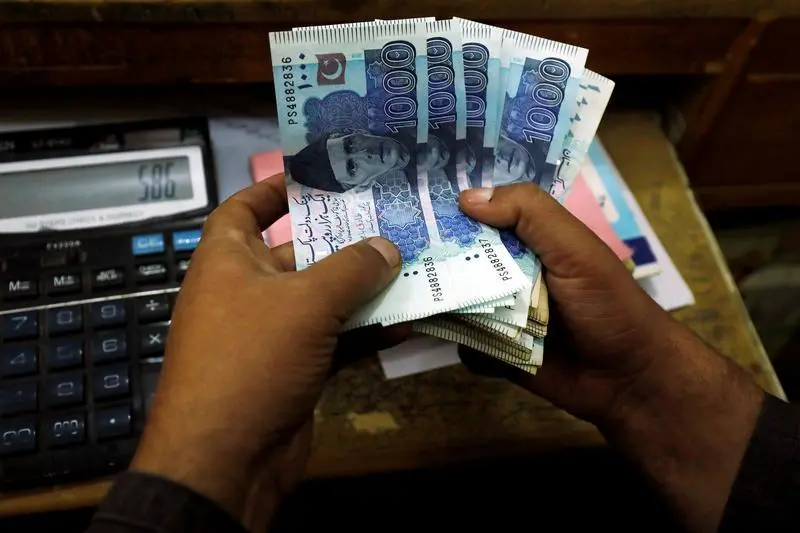PHOTO
The Pak rupee is expected to stage a strong rebound in August after posting second worst monthly performance since 1972 by losing 17 per cent against the US dollar in the interbank last month, experts say.
Analysts, forex traders and market insiders said the rupee's depreciation in July is unjustified as most of the economic indicators are still good despite the political instability in the country.
They said the rupee should recover at least five per cent of its value once the IMF's executive board gives a go ahead to disburse $1.2 billion loan tranche under its $6 billion extend fund facility.
The IMF's green signal will unlock the disbursement of at least $5 billion lending from other multinational donors and friendly nations that will help stabilise the Pakistan economy in general and the rupee in particular in the coming weeks.
"The rupee is trading at much lower levels at the moment and it will bounce back once the Internation Monetary Fund (IMF) resumes lending and there is a political stability in the country," experts said.
The rupee hit an all-time low in the interbank and open markets on Friday due to higher demand of the US dollar and other major currencies. It traded as high as 250 against the dollar in the open market, but recover 0.24 per cent in the interbank market and ended at 239.37 against the greenback, the first gain in nearly two weeks after consistent decline in 10 consecutive sessions.
The South Asian nation currency shed 35.61 per cent, or 62.86 against the US dollar this year so far. It lost 16.86 per cent of its value since the start of new financial year 2022-23 in July. It is also the worst decline globally after Ukraine’s currency for the month.
Analysts and forex market experts have cited the import payment pressure, deepening political crisis, the delay in the IMF's loan disbursement, and the depleting foreign reserves as some of the key reasons for the rupee's freefall since the fall of Imran Khan government in April.
Former finance minister Shaukat Tarin held the sitting regime responsible for the rupee's depreciation and said the government is miserably failed to resolve key economic issues being faced by the country.
"The rupee lost significantly in the first 100 days of the present government as it failed to take immediate steps to resolve key issues such as appointment of the central bank governor," Tarin told Khaleej Times.
"Governor plays an important role in stabilising the local currency, but the government has so far shown a non-serious attitude to appoint a qualified and competent person to lead State Bank of Pakistan. The currency is losing its value everyday, as the temporary set up is unable to control the situation and bring stability in the exchange rate and stock market," he said.
"There are many ways to stabilise the rupee until we get funds from the International Monetary Funds, multinational donors and other friendly nations. But, the US dollar climbs due to the government's non-competitiveness as exporters are not bringing back foreign currency, there are decreasing foreign inflows and resultantly there is a shortage of the dollars in the market," he said.
Pakistan-Kuwait Investment Company's head of research Samiullah Tariq said the rupee depreciated 17 per cent during the last month as inflow of funds was unable to cater to the rising imports on the back of higher petroleum products.
"There was a crunch of liquidity in the forex market while higher interest rates in the US also impacted the rupee performance," Tariq told Khaleej Times on Sunday.
In reply to a question, he said the rupee should not go down below 245 to a US dollar in the interbank market.
"Once the US dollar rally stops, the rupee would be able to recover at least five per cent. In my view it would trade between 230-235 as majority of the depreciation has already been taken place," he said.
Last week, Finance Minister Miftah Ismail said the pressure on the rupee would 'vanish' in next couple of weeks.
"The inflow of dollars into Pakistan would soon be higher than the outflow, resulting in a stable exchange rate in the coming weeks," Miftah said.
Zafar Paracha, general secretary of Exchange Companies Association of Pakistan, said the rupee will bounce back strongly once the political stability returns as the country's economic indicators are good to support the currency.
"The rupee's recent decline is not on merit and it will recover some grounds in coming weeks after the resumption of the IMF programme this month," Paracha said.
Copyright © 2022 Khaleej Times. All Rights Reserved. Provided by SyndiGate Media Inc. (Syndigate.info).





















